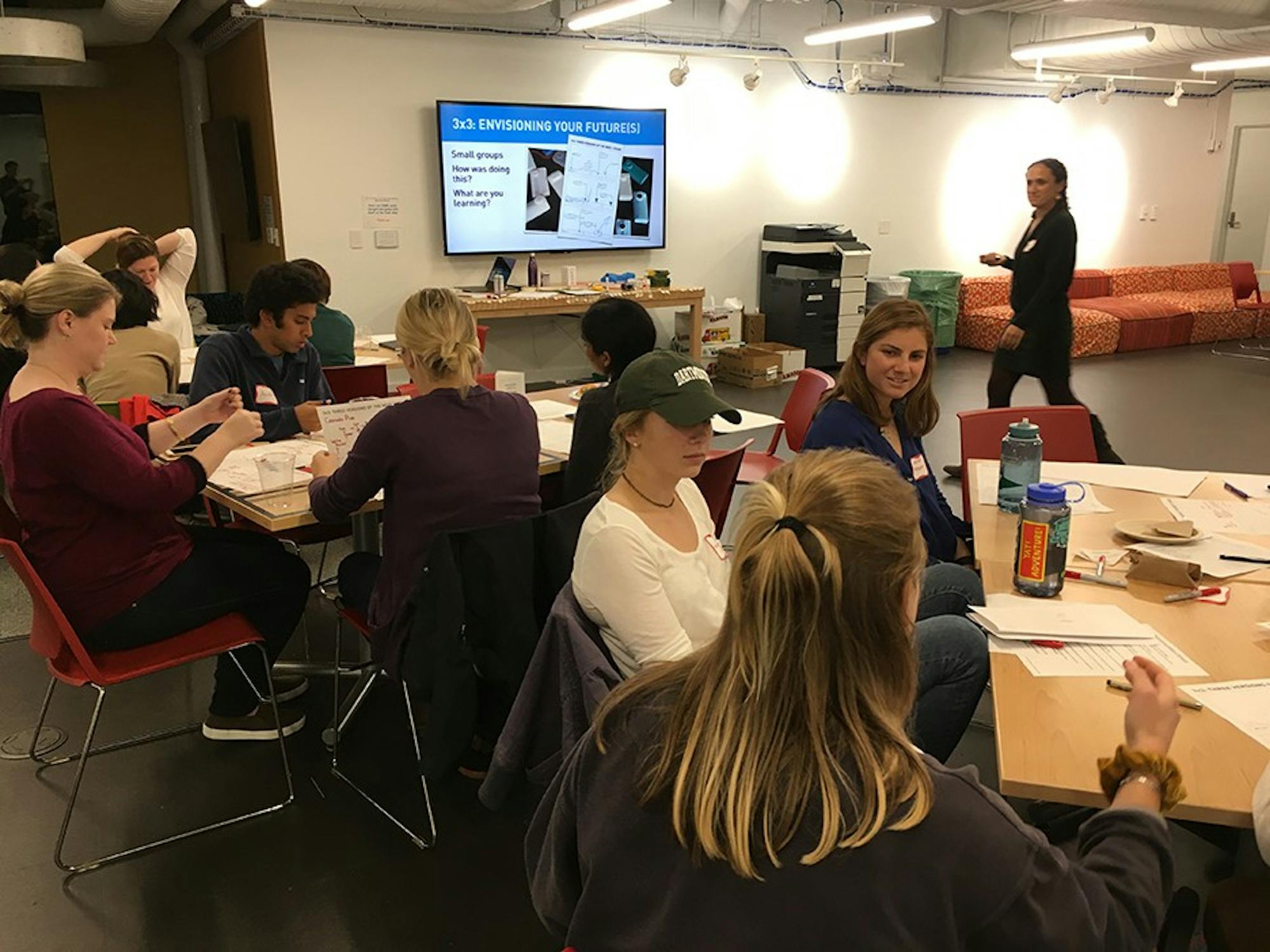About 40 students and staff members attended a “Designing Your Life” workshop at House Center B on Monday. The three-hour long interactive workshop included several experiments and activities that challenged students’ perceptions and encouraged open-mindedness.
The workshop was organized by design thinking lecturer Eugene Korsunskiy and assistant director for health improvement at the Student Wellness Center Mary Nyhan and hosted by Allen House.
In a joint interview, Korsunskiy and Nyhan emphasized the practical benefits of integrating the design principle of prototyping into students’ lives, suggesting methods include learning by doing, avoiding over-thinking, exposing and testing assumptions and failing early to succeed often.
In the workshop, they also discussed the importance of reframing existing dysfunctional beliefs, such as, “I’m stuck,” which was reframed as “I’m never stuck because I can always generate a lot of ideas.”
Attendees were challenged to generate three distinctly different potential timelines for their lives in the next three years and collaborate with each other to come up with ways to explore possible futures before committing to them.
Nyhan said that there was value in bringing students together to discuss shared experiences.
“It’s important to normalize or shed light on the fact that this is an inherently stressful time of life, and that you don’t have to hide that,” Nyhan said. “We can build community around this shared feeling. And then, as a bonus, we can think about how we can make it less stressful.”
The “Designing Your Life” curriculum can also help students navigate difficult decisions, according to Thayer School of Engineering professor Peter Robbie.
“The concept of prototyping and identifying lots of options basically changes the challenge from deciding to designing,” Robbie said. “You’re designing alternatives. You’re not deciding when you’re 20 what you’re going to do when you’re 50.”
Korsunskiy said the workshop was adapted from a “Designing Your Life” course at Stanford University, which encouraged students to apply the principles of design thinking to their own lives.
After Korsunskiy took the class as a design graduate student at Stanford, he said he was asked to help teach the class to undergraduates and develop a version of the class for freshmen and sophomores that was called “Designing your Stanford.” He taught the class for two years before serving as senior coordinator of design initiatives at the University of Vermont and then coming to Dartmouth.
Nyhan said she and Robbie attended a “studio for higher education” at Stanford in June to learn about the methodology behind “Designing Your Life.”
“[Design thinking] is a methodology that’s been a gold standard for innovation for a long time,” Robbie said. “But people hadn’t really thought about how could you rethink those tools to apply to one’s self.”
Korsunskiy added that it was important to first “prototype” the model to determine the best way to incorporate the “Designing Your Life” curriculum at Dartmouth.
“One thing that designers try to pride themselves on being is context-sensitive,” he said. “And so, the idea of copying and pasting something from one context into another usually doesn’t sit well or go well. Maybe there’s one future in which [Designing your Life] is a full 10-week class, maybe there’s one future where it’s a [physical education class], maybe there’s one future in which it’s residential, maybe it’s a format that we haven’t even thought up or invented yet.”
Nyhan said several other institutions are bringing adaptations of Stanford’s “Designing Your Life” course to their own campus, such as Cornell University, Harvard University, Trinity College, the University of California, Berkeley, University of Michigan and Yale University.
“We’re building this effort among institutions where we can share prototypes to the benefit of everybody,” she said. “We’re all learning from what everybody’s trying on their own campuses.”
Korsunskiy said the workshop received positive feedback from participants. Many students said they felt less anxious and more likely to prototype their new ideas after participating in the workshop, he added.
“We’re super excited to see what else we can make happen [at Dartmouth],” Korsunskiy said. “It’s wonderfully affirming that this content seems to be something that people are actually curious to experience and interested in participating in.”
Rachel is a '21 from Plainsboro, NJ and is currently serving as the editor-in-chief of the 177th directorate. She is pursuing a double major in economics and philosophy.




